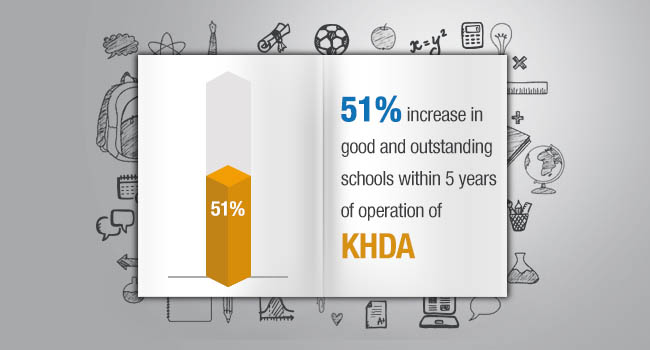Private schools have become ubiquitous in UAE for some time now. But unlike the public education sector, its counter-parts were not monitored that often. As a result the quality of education took a dip, but the number of private schools went on increasing. Likewise, school fees were also becoming a major concern as most private schools had increased their fees several folds.
The lack of knowledge about where the trouble is also made it difficult for schools to improve its quality. The necessity of a body which collects such data was becoming unavoidable.
Enter KHDA
Prior to KHDA, parents, teachers and students had no clue about the performance of schools and had to blindly join schools based on hunches. The mission for KHDA at hand was to improve the private education sector. To help with this, they appointed the Dubai School Inspection Board (DSIB) to collect data on private schools.
The data collection is done on an annual basis and these data are made available online. The data can even be obtained through mobile apps. These data can be used by schools to improve upon themselves. It also allows parents to get an idea of which school to opt for.
Stats show that within the first 5 years of its operation, KHDA has witnessed 51% increase in schools labelled as good and outstanding. Apart from identifying the weaker schools, KHDA also does its bit to help improve the condition of these schools. This approach was to help those schools that could not improve by themselves. Adding to this, events like "What Works" are also conducted to enlighten teachers on what to do in order to improve quality.
Lessons to Be Learnt
- All aspects of the private schools need to be monitored and help must be given to weaker schools to improve performance.
- An information collecting body needs be appointed for this purpose.
- Based on the information collected, a database needs to be formed which contains the list of schools based on their performance.
- All the information collected needs to be made available to parents and students easily and nowadays a website is the best way of sharing all this information.
- Schools must also be able to access this information and make use of them to improve. The data collected needs to specify the areas where the schools need to improve and take actions accordingly.
- Transparency of information should be made compulsory and is considered to be the hallmark of good governance. For this all the information that is collected should be made available to the public.
- The information parents and schools get needs to be authentic in order to be made useful.
- The fee structure for a school needs to be constructed on the basis of the quality that they are willing to provide. Hence a neutral body such as KHDA could be of great help in identifying outstanding schools.
- The database needs to be updated regularly based on a periodic scrutiny of the schools.
- The role played by this body should not just be confined to collecting data and making them available to the public. They must also take responsibility to improve the quality of education by improving the condition of the educational institutions.
- They must also be able to suggest methods by which the schools can improve their performances.
- Collaboration of schools rather than competition is what is required to help develop the education system on a whole, than just focusing on particular school.
The performance boost of private schools has been so remarkable that other countries too can take a few tips from KHDA. Especially in a country like India where a new private school is built every month, such performance analysis could be vital.
